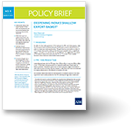
RCI-POD
WEBINAR 2
10:00–11:30am
Manila Platform: Microsoft Teams Meeting
Risks of Financial Contagion Through the Global Banking Networks
The pandemic could trigger a recession in a world economy that is already heavily indebted. Economic recessions imply lower corporate earnings and higher unemployment, exacerbating the risk of debt crisis. This webinar introduced a new study on “the impact of nonperforming loans in cross-border bank lending and implications for emerging market economies”, discussed the risk of financial contagion, and explored policy options to avoid a debt crisis during the COVID-19 crisis.
Video Link:
-
Link to YouTube
Downloads:
-
Brochure (PDF)
Previous Episode:
-
The Role of Asia’s Financial Safety Net during COVID-19
9 Jun 2020 11:00–12:30pm
Manila Next Episode:
-
Immediate and Long-Term Impact of COVID-19 on Trade Landscape
23 Jun 2020 10:00–11:30am
Manila Featured publication:
-

- Presentation:The Impact of Nonperforming Loans on Cross-Border Bank Lending: Implications for Emerging Market Economies
 Cyn-Young Park Director, ERCI, ADBBio
Cyn-Young Park Director, ERCI, ADBBioCyn-Young Park is Director of the Regional Cooperation and Integration Division in the Economics Research and Regional Cooperation Department of the Asian Development Bank (ADB). In her current capacity, she manages a team of economists to examine economic and policy issues related to regional cooperation and integration (RCI) and develop strategies and approaches to support RCI. During her progressive career within ADB, she has been a main author and contributor to ADB’s major publications including Asian Development Outlook (ADB’s flagship publication), Asia Capital Markets Monitor, Asia Economic Monitor, Asia Bond Monitor, and ADB Country Diagnostic Study Series. She has also participated in various global and regional forums including the G20 Development Working Group, Association of Southeast Asian Nations (ASEAN), ASEAN+3, Asia-Pacific Economic Cooperation (APEC), and Asia-Europe Meeting (ASEM). She has written and lectured extensively about the Asian economy and financial markets. Her work has been published in peer reviewed academic journals including the Journal of Banking and Finance, the Journal of Futures Markets, the Review of Income and Wealth, and the World Economy.
Prior to joining the ADB, she served as Economist (1999-2002) at the Organisation for Economic Cooperation and Development (OECD), where she contributed to the OECD Economic Outlook. She received her Ph.D. in Economics from Columbia University. She holds a bachelor degree in International Economics from Seoul National University.
 Kwanho Shin Professor, Korea UniversityBio
Kwanho Shin Professor, Korea UniversityBioKwanho Shin is Professor of Economics at Korea University. He received his B.A. and M.A. in economics from Seoul National University and Ph.D. in economics from UCLA. He was Assistant Professor at the University of Kansas for four years and occasionally taught at UCLA, Claremont Graduate University and Claremont McKenna College as a visiting professor. He was elected as “One of the Fifty Future Leaders in Korea” by the Seoul Economic Daily in 2010 and a MaeKyung Economist by the Maeil Business Newspaper in 2011. He also served as a council member for the National Economic Advisory Council from 2010 to 2011. He has published widely on the subjects of business cycles, monetary economics, international finance and labor economics in a number of leading academic journals including American Economic Review, Journal of Monetary Economics, Journal of Econometrics, Journal of Money, Credit and Banking, Journal of International Economics, Journal of International Money and Finance and Journal of Labor Economics.
Moderator: Yasuyuki Sawada Chief Economist and Director General, ERCD, ADBBio
Yasuyuki Sawada Chief Economist and Director General, ERCD, ADBBioYasuyuki Sawada is Chief Economist of the Asian Development Bank (ADB) and Director General of its Economic Research and Regional Cooperation Department. He is chief spokesperson on economic and development trends, and leads the production of ADB’s flagship knowledge products and support for regional cooperation fora. Before joining ADB, Mr. Sawada was Professor of Economics at the University of Tokyo, and has led numerous large-scale development policy evaluation projects for various institutions. His key research areas are development economics, microeconometrics, economics of disasters, and field surveys and experiments. Mr. Sawada obtained his Ph.D. in Economics from Stanford University.
Panelists: Eli Remolona Professor of Finance and Director of Central Banking, Asia School of BusinessBio
Eli Remolona Professor of Finance and Director of Central Banking, Asia School of BusinessBioEli Remolona is Professor of Finance and Director of Central Banking at the Asia School of Business (ASB) in Kuala Lumpur. He directs the Master of Central Banking program, a collaborative effort with the MIT Sloan School of Management. He is also Adviser to the Academy of Finance in Hong Kong and Associate Editor of the International Journal of Central Banking. Before joining the ASB and MIT Sloan in 2019, Eli was Chief Representative for Asia and the Pacific of the Bank for International Settlements (BIS) from 2005 to 2018. He joined the BIS in 1999, where for six years he served as Head of Financial Markets and Editor of the BIS Quarterly Review. Eli was also Research Officer of the Federal Reserve Bank of New York, where for 14 years he was engaged in FOMC briefings and in research on issues in international finance, financial markets and sovereign risk. He has taught at Williams College, Columbia University, New York University and the School of Economics of the University of the Philippines. He holds a Ph.D. in economics from Stanford University.
 Cyn-Young Park Director, ERCI, ADBBio
Cyn-Young Park Director, ERCI, ADBBioCyn-Young Park is Director of the Regional Cooperation and Integration Division in the Economics Research and Regional Cooperation Department of the Asian Development Bank (ADB). In her current capacity, she manages a team of economists to examine economic and policy issues related to regional cooperation and integration (RCI) and develop strategies and approaches to support RCI. During her progressive career within ADB, she has been a main author and contributor to ADB’s major publications including Asian Development Outlook (ADB’s flagship publication), Asia Capital Markets Monitor, Asia Economic Monitor, Asia Bond Monitor, and ADB Country Diagnostic Study Series. She has also participated in various global and regional forums including the G20 Development Working Group, Association of Southeast Asian Nations (ASEAN), ASEAN+3, Asia-Pacific Economic Cooperation (APEC), and Asia-Europe Meeting (ASEM). She has written and lectured extensively about the Asian economy and financial markets. Her work has been published in peer reviewed academic journals including the Journal of Banking and Finance, the Journal of Futures Markets, the Review of Income and Wealth, and the World Economy.
Prior to joining the ADB, she served as Economist (1999-2002) at the Organisation for Economic Cooperation and Development (OECD), where she contributed to the OECD Economic Outlook. She received her Ph.D. in Economics from Columbia University. She holds a bachelor degree in International Economics from Seoul National University.
 Kwanho Shin Professor, Korea UniversityBio
Kwanho Shin Professor, Korea UniversityBioKwanho Shin is Professor of Economics at Korea University. He received his B.A. and M.A. in economics from Seoul National University and Ph.D. in economics from UCLA. He was Assistant Professor at the University of Kansas for four years and occasionally taught at UCLA, Claremont Graduate University and Claremont McKenna College as a visiting professor. He was elected as “One of the Fifty Future Leaders in Korea” by the Seoul Economic Daily in 2010 and a MaeKyung Economist by the Maeil Business Newspaper in 2011. He also served as a council member for the National Economic Advisory Council from 2010 to 2011. He has published widely on the subjects of business cycles, monetary economics, international finance and labor economics in a number of leading academic journals including American Economic Review, Journal of Monetary Economics, Journal of Econometrics, Journal of Money, Credit and Banking, Journal of International Economics, Journal of International Money and Finance and Journal of Labor Economics.